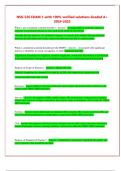NSG 526 EXAM 1-with 100% verified solutions Graded A+
2024-2025
What is not considered a mental disorder? - Answer- -An expectable or culturally approved
response to a common stressor or loss, such as the death of a loved one
-Socially deviant behavior (i.e. political, religious, or sexual) and conflicts that are primarily
between the individual and society (unless the behaviors are due to a dysfunction)
What is considered a mental disorder per the DSM5? - Answer- -Associated with significant
distress or disability in social, occupation, or other important activities
-Significant disturbance in cognition, emotion regulation, or behavior that reflects a dysfunction
in the psychological, biological or developmental processes underlying mental functioning
Purpose of Scope of Practice? - Answer- -Define NP roles
-Identify competencies assumed to be held by all NPs who function in a particular role
-Varies broadly from state to state
Hormones - Answer- Refers to thyroid, parathyroid, adrenal gland, and gonad-related conditions in the
context of the THINC MED mnemonic.
Infection - Answer- Encompasses AIDS, syphilis, herpes, TB, Lyme disease, mononucleosis, hepatitis,
chronic sinus infection, allergies, strep throat, and systemic lupus erythematosus (SLE) within the THINC
MED mnemonic.
Nutrition - Answer- Covers deficiencies in cobalamin (B12), thiamine (B1), niacin, pyridoxine (B6), and
iron overload (hemochromatosis), among others, as part of the THINC MED mnemonic.
CNS - Answer- Encompasses mild head trauma, multiple sclerosis (MS), seizure disorders, Parkinson's
disease, Huntington's disease, learning disabilities, and dyslexia within the THINC MED mnemonic.
Purpose of Standard of Practice? - Answer- -Authoritative statements regarding the quality and
type of practice that should be provided
,-Provide a way to judge the nature of care provided
-Reflect the expectation for the care that should be provided to clients with various illnesses
-Reflect professional agreement focused on the minimum levels of acceptable performance
-Can be used to legally describe the standard of care that must be met by a provider
-May be precise protocols that must be followed or more general guidelines that recommend
actions
Purpose of Psychiatric Interview? - Answer- Understand the patient's illness to evaluate the
effect on their lives and create a beginning diagnosis and treatment plan
What is a Therapeutic Alliance? - Answer- -Create a relationship with client by being calming,
warm, understanding, kind, respectful, concerned and focused
-Able to help patient better if a therapeutic alliance was formed
First Principle of Psychotherapy - Answer- Viewing a new patient as a whole person with a unique
personality and lifestyle, aiming to uncover personal strengths.
Second Principle of Psychotherapy - Answer- Requiring a good match between the patient and the
therapist, with strong rapport-building skills and communication at the patient's level.
Common Myth in Psychotherapy - Answer- Psychologists can read minds,
(behavior is complex and the actual problem faced by the patient may differ significantly from the one
initially described).
Assessment of Readiness to Change - Answer- The therapist assessing each patient, being attentive to
signs of openness or resistance.
Patient's Desire for Change - Answer- The assumption that patients deeply desire change, despite any
resistance exhibited, and the importance of cultivating hope and encouraging positive change.
Role of the Patient in Change - Answer- The patient being responsible for initiating and implementing
change, while the therapist facilitates the process and provides support.
,Belief in Growth Potential - Answer- Operating from the principle that each person has the capacity for
psychological growth, viewing problems as opportunities for growth and believing in the potential for
continuous improvement.
Teaching Techniques and Procedures - Answer- Therapists teaching to help patients manage their issues,
such as:
relaxation exercises,
scheduling positive activities,
challenging negative thinking patterns, and
learning social skills.
Activation/Inhibition Coordination - Answer- Helping patients initiate positive actions and thoughts while
inhibiting blockages to change.
Important components of a therapeutic alliance? - Answer- -Therapist and patient work
collaboratively to create therapeutic change through an affectionate bond
-Agreement on goals of therapy
-The therapist's ability to be empathetic and involved in therapy
-The ability of the patient to do the work of therapy
What is Psychotherapy? - Answer- Holistic treatment that relies on the nurse's processing of that
the patient is experiencing
Peplau's most universal contribution to PMHNPs? - Answer- -Her application of Sullivan's
theory of anxiety to nursing practice
-Described the effects of different levels of anxiety (mild, moderate, severe, and panic) on
perception and learning
-Promoted interventions to lower anxiety, with the aim of improving clients' abilities to think and
function at more satisfactory levels
Per Peplau, skills of a MH nurse? - Answer- -Observation, interpretation, and intervention
, (The PMHNP observes and listens to the client, developing impressions about the client's
situation)
What is the main idea for Peplau's Theory of Interpersonal Relationships? - Answer- -The
processes by which the nurse helps clients make positive changes in their health care status and
well-being
-Believed that illness offered a unique opportunity for experiential learning, personal growth, and
improved coping strategies and that PMH-APRNs play a unique role in facilitating this growth
Therapeutic Communication Techniques? - Answer- -Silence
-Accepting
-Giving recognition
-Giving information
-Offering self
-Giving broad openings
-Offering general leads
-Placing the event in time or sequence
-Making observation
-Encouraging description of perceptions
-Encouraging comparison
-Reflection
-Exploring
-Seeking clarification
-Presenting reality
-Voicing doubt
-Verbalizing the implied
-Attempting to translate into feelings
-Encouraging formulation of a plan of action
-Summarizing




